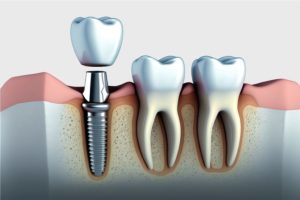Dental Implant Diversion: 3 Ways to Prevent a Failure
January 8, 2024

Dental implants are often considered the ideal replacement for missing teeth because they have a success rate of more than 90% and provide unique benefits that other options don’t. They’re the only restoration that includes a surgically inserted post (abutment) that fuses with your jawbone and acts like a root to keep it healthy. Although dental implants are incredibly durable, it’s important to remember that there’s still a possibility that yours could fail. Keep reading to learn about 3 bad habits to avoid that will keep your dental implant in tip-top shape.
Bad Habit #1: Skipping Your Routine
One of the many advantages of having a dental implant is that the upkeep is as simple as consistently brushing and flossing your teeth twice daily. That said, it can be easy to forget your regimen if you’re rushing to get out the door in the morning or are collapsing into bed after a long, stressful day. Unfortunately, this negatively impacts your oral health as well as your implant.
You’re more likely to develop gum disease if you’re not regularly flossing away plaque buildup, which can lead to receding gums. As they pull away from your teeth, they no longer provide a stronghold for your pearly whites, and you might lose them along with your dental implant.
Bad Habit #2: Using Tobacco
If you smoke or chew tobacco, you’re likely to damage your dental implant. Tobacco products contain nicotine which is not only addictive but also lowers your blood oxygen content and reduces its flow. Your body is unable to deliver the required nutrients to your teeth and gums as a result. This is known to contribute to tooth decay, gum disease, oral cancer, and other serious medical conditions. If you want to keep your grin in top condition, do your best to kick this toxic trait. Your overall well-being and dental implant will both thank you!
Bad Habit #3: Missing Appointments
Now that your dental implant is in place and your smile is functional once again, it’s tempting to skip visits to your dentist if you don’t have an immediate issue. Doing so can be detrimental to your restoration, however, because those appointments include essential preventative care. It’s possible to have developed a cavity or gum disease without knowing it which, if left unaddressed, can lead to dental implant failure, emergency root canal treatments, or other costly outcomes. You should see your dentist every 6 months so they can monitor your condition to catch signs of problems early enough to treat them before they progress.
By avoiding these pitfalls, you’ll be much more likely to keep your smile whole for years to come!
About the Author
Dr. Hiren H. Shah has more than a decade of experience helping transform patients’ lives by improving their dental health. He attended Rutgers University for his undergraduate education and then completed his dental doctorate at New York University. He has also completed 1000+ hours of continued education focused on dental implants, making him a trusted expert. His practice uses state-of-the-art technology like digital imaging and impressions for flawless results. If you’d like a consultation, you’re welcome to request an appointment on the website or call (908) 834-8448.
No Comments
No comments yet.
RSS feed for comments on this post.
Sorry, the comment form is closed at this time.
